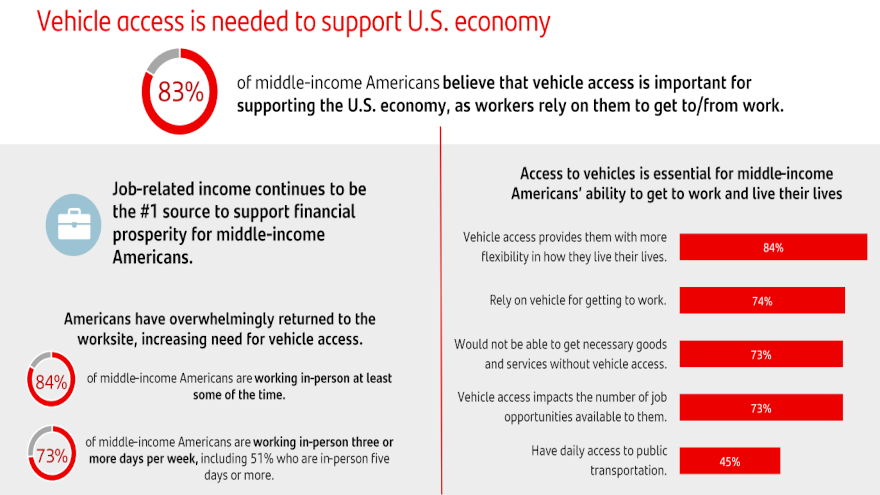Santander study reinforces value of vehicle access

Chart courtesy of Santander Holdings USA .
By subscribing, you agree to receive communications from Auto Remarketing and our partners in accordance with our Privacy Policy. We may share your information with select partners and sponsors who may contact you about their products and services. You may unsubscribe at any time.
Santander Holdings USA recently announced findings from a new survey that shows middle-income American consumers were feeling optimistic in the fourth quarter, with 70% of respondents believing they are on the right track toward achieving financial prosperity and 80% believing they would achieve financial prosperity in the next 10 years.
And what’s likely going to get those individuals to their goals? Having access to a vehicle or two.
According to the Santander survey, more than eight in 10 believe vehicle access is important for supporting the U.S. economy so workers can get to/from work.
Experts said job-related income remains the No. 1 source to support financial prosperity for middle-income Americans, and three in four of Americans rely on a vehicle to get to work.
Santander acknowledged only 45% of middle-income workers have daily access to public transportation.
The survey showed overwhelmingly middle-income Americans are working in-person at least some of the time (84%), increasing demand for vehicles. This includes 73% who are working in-person three or more days a week.
Subscribe to Auto Remarketing to stay informed and stay ahead.
By subscribing, you agree to receive communications from Auto Remarketing and our partners in accordance with our Privacy Policy. We may share your information with select partners and sponsors who may contact you about their products and services. You may unsubscribe at any time.
The survey also found 50% of middle-income Americans delayed purchasing a vehicle in 2023 due to cost, while 42% are considering purchasing a new or used vehicle in 2024.
In light of that trend, Santander also mentioned less than a quarter described themselves as “financially insecure,” down four percentage points from the first quarter.
Meanwhile, seven in 10 said they were spending at least as much as the previous year if not more on holiday gift giving, and a majority said they believed their gift giving reflects their own financial prosperity.
“While there are positive signals across the U.S. economy, American households continue to face financial challenges in their day-to-day lives that are contributing to their recession expectations,” Santander CEO Tim Wennes said in a news release.
“At Santander, we remain dedicated to supporting our customers by helping them to navigate these headwinds so they can achieve a financially prosperous future,” Wennes continued.
Despite the optimistic view, Santander said middle-income Americans acknowledge there are headwinds with two-thirds reporting that they expect the United States will enter a recession in 2024.
The majority of respondents (57%) said they have already delayed a major financial decision due to concerns about a recession. Inflation remains a primary concern along with rising healthcare premiums and student debt, according to the Santander research.
In fact, while the majority of middle-income Americans (62%) are setting financially related goals, only one third are highly confident they can achieve their goals.
This research on financial prosperity, conducted by Morning Consult on behalf of Santander, surveyed 2,204 Americans who are bank and/or financial services customers, ages 18-70. Survey participants are employed or looking for work and own/use at least one financial product and are the primary or shared-decision maker on household finances with household income in the “middle-income” range of $47,000 to $142,000.
This fourth quarter study was conducted in December. The interviews were conducted online, and the margin of error is 2 percentage points for the total audience at a 95% confidence level.
The data was weighted to target population proportions for a representative sample based on age, gender, ethnicity, region and education.


